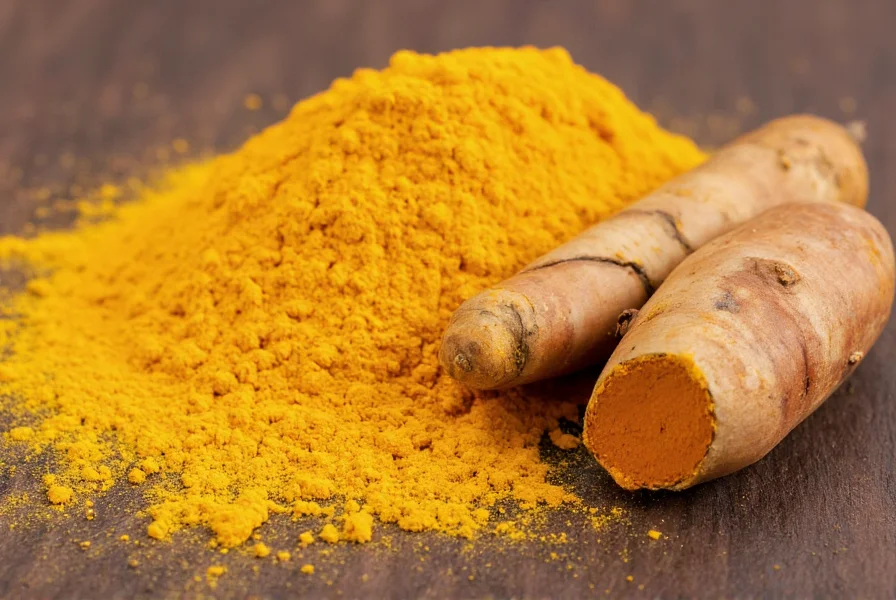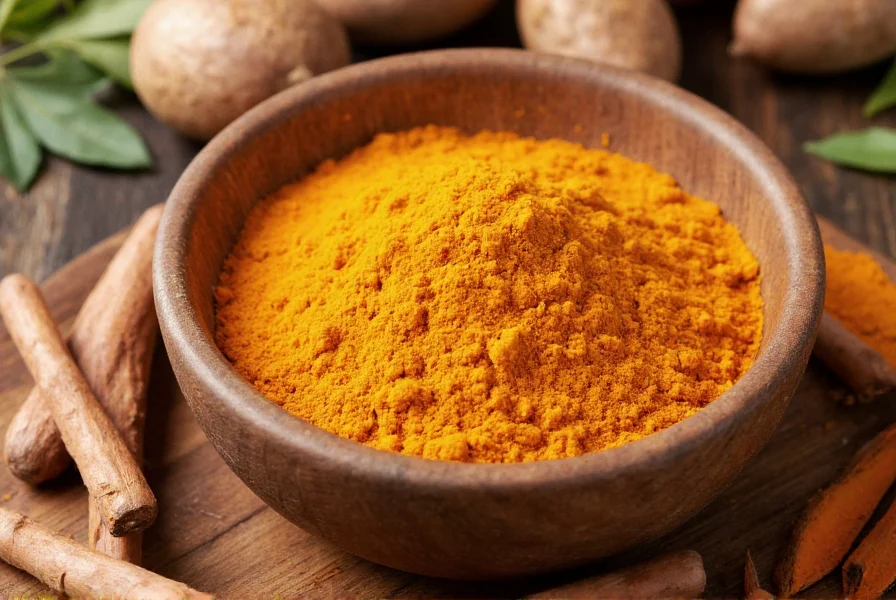For centuries, turmeric has been a cornerstone of traditional medicine systems across Asia. Modern science is now validating many of these traditional uses while uncovering new potential health applications. This vibrant yellow spice, derived from the Curcuma longa plant's rhizomes, contains curcuminoids—primarily curcumin—which account for most of its therapeutic properties.
The Science Behind Turmeric's Power
Curcumin represents only about 3% of turmeric by weight, yet it's responsible for most of the scientifically documented turmeric health benefits. This polyphenol compound demonstrates remarkable biological activity, particularly its ability to interact with multiple molecular targets involved in inflammation and oxidative stress.
What makes curcumin particularly interesting to researchers is its dual action as both an anti-inflammatory agent and a powerful antioxidant. Unlike many pharmaceutical anti-inflammatories that target single pathways, curcumin appears to influence multiple inflammatory pathways simultaneously—a characteristic that may explain its broad therapeutic potential.
Key Scientifically Supported Turmeric Benefits
1. Potent Anti-Inflammatory Effects
Chronic inflammation contributes to numerous modern diseases. Curcumin's anti-inflammatory properties of turmeric rival some anti-inflammatory drugs but without their side effects. A comprehensive review published in the Journal of Medicinal Food found curcumin effectively reduced inflammatory markers in multiple clinical trials.
For individuals seeking natural joint pain relief with turmeric, research shows promising results. A 2016 study in the Journal of Medicinal Food demonstrated that 1,000 mg of curcumin daily significantly improved pain and function in people with knee osteoarthritis—comparable to the effects of ibuprofen but with better gastrointestinal tolerance.
2. Powerful Antioxidant Activity
Curcumin neutralizes free radicals while also stimulating the body's own antioxidant enzymes. This dual action makes it particularly effective against oxidative damage, which contributes to aging and many diseases. Research in the journal Oxidative Medicine and Cellular Longevity confirms curcumin's ability to increase levels of glutathione, superoxide dismutase, and catalase—key endogenous antioxidants.

3. Brain Health and Cognitive Function
Curcumin increases brain-derived neurotrophic factor (BDNF), a growth hormone that functions in the brain. Declining BDNF levels are associated with depression and Alzheimer's disease. A double-blind, placebo-controlled study published in the American Journal of Geriatric Psychiatry found that curcumin supplementation improved memory and attention in non-demented adults over 18 months.
4. Cardiovascular Support
Research indicates curcumin improves endothelial function—the lining of blood vessels—which is crucial for regulating blood pressure. A study in Nutrition Research showed that curcumin supplementation improved endothelial function as effectively as exercise in postmenopausal women. The turmeric benefits for heart health appear to extend to improving cholesterol profiles and reducing oxidation of LDL cholesterol.
| Benefit Category | Scientific Support Level | Recommended Daily Amount |
|---|---|---|
| Anti-inflammatory effects | Strong human evidence | 500-1,000 mg curcumin |
| Antioxidant activity | Strong laboratory evidence | 500-1,000 mg curcumin |
| Joint pain relief | Moderate human evidence | 1,000 mg curcumin |
| Cognitive support | Emerging human evidence | 500-1,000 mg curcumin |
Maximizing Turmeric Absorption: The Critical Factor
One major limitation of turmeric is its poor bioavailability—your body struggles to absorb curcumin effectively. However, research shows several strategies to enhance how to absorb turmeric better:
- Combine with black pepper: Piperine in black pepper increases curcumin absorption by up to 2,000% (study in Planta Medica)
- Consume with healthy fats: Curcumin is fat-soluble, so pairing with oils, avocado, or nuts improves uptake
- Heat gently: Light cooking enhances curcumin solubility without degrading the compound
- Consider formulations: Some supplements use phospholipid complexes or nanoparticles to improve bioavailability
Important Considerations and Safety
While turmeric is generally safe as a culinary spice, higher therapeutic doses require consideration of potential turmeric side effects and safety concerns:
- May interact with blood thinners like warfarin
- Potentially lowers blood sugar, requiring monitoring for diabetics
- High doses might cause gastrointestinal discomfort in sensitive individuals
- Should be used cautiously before surgery due to potential blood-thinning effects
The recommended turmeric dosage for health benefits typically ranges from 500-2,000 mg of curcumin daily, though culinary use (about 1-3 grams of turmeric powder) provides more modest benefits. Always consult with a healthcare provider before using turmeric therapeutically, especially if you have medical conditions or take medications.

Practical Ways to Incorporate Turmeric
For those seeking the best way to consume turmeric for maximum benefit:
- Golden milk: Warm milk (dairy or plant-based) with turmeric, ginger, black pepper, and a healthy fat like coconut oil
- Curry dishes: Traditional preparation with fats and black pepper enhances absorption
- Smoothies: Blend with fruits, vegetables, and healthy fats like avocado or almond butter
- Tea: Simmer turmeric with ginger, lemon, and a pinch of black pepper
- Supplements: Look for formulations containing piperine or phospholipids for better absorption
Separating Evidence from Hype
While the scientifically proven turmeric benefits are impressive, it's crucial to distinguish established facts from preliminary research. Many studies showing dramatic effects used highly concentrated curcumin extracts—far beyond what you'd get from culinary use. Additionally, most promising cancer research has been conducted in test tubes or animals, not humans.
The most robust evidence supports turmeric's anti-inflammatory and antioxidant effects, with growing but still developing evidence for cognitive and cardiovascular benefits. Claims about turmeric curing serious diseases typically lack sufficient human evidence and should be viewed skeptically.
Conclusion: Realistic Expectations for Turmeric Benefits
Turmeric represents a powerful addition to a health-supportive diet, particularly for its anti-inflammatory and antioxidant properties. The most evidence-based turmeric health applications focus on reducing inflammation, supporting joint health, and providing antioxidant protection. When consumed properly—with black pepper and healthy fats—its benefits become more accessible.
While not a miracle cure, incorporating turmeric into your regular diet offers a safe, natural way to support overall wellness. For therapeutic applications, consult with a healthcare provider to determine appropriate dosing and ensure it won't interact with any medications you're taking.
What are the most scientifically proven benefits of turmeric?
The most scientifically supported turmeric benefits include its potent anti-inflammatory effects, strong antioxidant properties, and potential improvements in joint health. Research shows curcumin can reduce inflammatory markers and provide relief for osteoarthritis. It also boosts the body's natural antioxidant enzymes. While promising, other benefits like cognitive enhancement and heart health support require more extensive human studies for conclusive evidence.
How much turmeric should I take daily for health benefits?
For culinary use, 1-3 grams of turmeric powder (about ½ to 1½ teaspoons) daily provides modest benefits. For therapeutic effects, studies typically use 500-2,000 mg of curcumin daily. Since curcumin makes up only about 3% of turmeric, you'd need approximately 5-20 grams of turmeric powder to get these amounts—far more than culinary use. Most people seeking therapeutic benefits use standardized curcumin supplements with enhanced absorption.
Why is black pepper important when consuming turmeric?
Black pepper contains piperine, which significantly enhances curcumin absorption. Research shows piperine can increase curcumin bioavailability by up to 2,000%. Without piperine or another absorption enhancer, your body processes and eliminates curcumin quickly, limiting its effectiveness. This is why traditional preparations of turmeric in Indian cuisine almost always include black pepper.
Can turmeric interact with medications?
Yes, turmeric may interact with certain medications. It can enhance the effects of blood thinners like warfarin, potentially increasing bleeding risk. Turmeric may also lower blood sugar, which could amplify the effects of diabetes medications. Additionally, it might interfere with drugs metabolized by certain liver enzymes. If you take prescription medications, consult your healthcare provider before using turmeric therapeutically.
What's the difference between turmeric and curcumin?
Turmeric is the spice derived from the Curcuma longa plant's rhizomes, while curcumin is the primary active compound within turmeric responsible for most health benefits. Turmeric contains only about 2-8% curcumin by weight, with the rest being other curcuminoids and compounds. Most research on turmeric's health effects focuses on curcumin, which is why many therapeutic products use concentrated curcumin extracts rather than whole turmeric powder.
Frequently Asked Questions
What are the most scientifically proven benefits of turmeric?
The most scientifically supported turmeric benefits include its potent anti-inflammatory effects, strong antioxidant properties, and potential improvements in joint health. Research shows curcumin can reduce inflammatory markers and provide relief for osteoarthritis. It also boosts the body's natural antioxidant enzymes. While promising, other benefits like cognitive enhancement and heart health support require more extensive human studies for conclusive evidence.
How much turmeric should I take daily for health benefits?
For culinary use, 1-3 grams of turmeric powder (about ½ to 1½ teaspoons) daily provides modest benefits. For therapeutic effects, studies typically use 500-2,000 mg of curcumin daily. Since curcumin makes up only about 3% of turmeric, you'd need approximately 5-20 grams of turmeric powder to get these amounts—far more than culinary use. Most people seeking therapeutic benefits use standardized curcumin supplements with enhanced absorption.
Why is black pepper important when consuming turmeric?
Black pepper contains piperine, which significantly enhances curcumin absorption. Research shows piperine can increase curcumin bioavailability by up to 2,000%. Without piperine or another absorption enhancer, your body processes and eliminates curcumin quickly, limiting its effectiveness. This is why traditional preparations of turmeric in Indian cuisine almost always include black pepper.
Can turmeric interact with medications?
Yes, turmeric may interact with certain medications. It can enhance the effects of blood thinners like warfarin, potentially increasing bleeding risk. Turmeric may also lower blood sugar, which could amplify the effects of diabetes medications. Additionally, it might interfere with drugs metabolized by certain liver enzymes. If you take prescription medications, consult your healthcare provider before using turmeric therapeutically.
What's the difference between turmeric and curcumin?
Turmeric is the spice derived from the Curcuma longa plant's rhizomes, while curcumin is the primary active compound within turmeric responsible for most health benefits. Turmeric contains only about 2-8% curcumin by weight, with the rest being other curcuminoids and compounds. Most research on turmeric's health effects focuses on curcumin, which is why many therapeutic products use concentrated curcumin extracts rather than whole turmeric powder.











 浙公网安备
33010002000092号
浙公网安备
33010002000092号 浙B2-20120091-4
浙B2-20120091-4